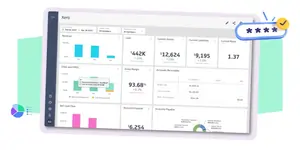Embracing Strategic Finance in the Tech World

- Monthly Recurring Revenue (MRR)
- Annual Recurring Revenue (ARR)
- Churn Rate
- Average Order Value (AOV)
Client A, a software provider in the business solutions sector, embarked on a journey to enhance its financial performance.
Client A faced several challenges, including high customer acquisition costs (Cac), lower client lifetime value (Ltv) Than anticipated, and inconsistent average order value (Aov). Client a implemented strategic financial planning in the it industry to address these issues and ensure financial stability, sustainable growth, and investor appeal. This involved leveraging advanced financial planning and analysis (FP&A) Techniques with valuable guidance from clear house accountants.
Background
Client a was founded in the mid-2000s and is well-known for its business solutions and software development. Despite the challenges of the market, this well-established corporation has managed to establish a strong presence in its niche. Their success can be attributed to their innovative approach, adaptability, and dedication to delivering state-of-the-art software solutions that cater to the evolving needs of their diverse customer base. However, as they expanded and fine-tuned their product lineup, they encountered some financial difficulties that prompted them to reevaluate their financial strategy.
This case study details the transformation of client a as they partnered with clear house accountants to enhance their financial performance and gain a competitive edge in the it sector.
Strategic Finance
Challenges Faced
Client a discovered that they were not monitoring certain metrics which were essential kpis required to measure performance in their industry. Client a was also struggling to benchmark their business with industry competition due to this. Despite its solid reputation as a software provider, they were encountering some Major financial issues which they were not able to drill down into due to lack of financial planning and analysis. Once analytical measures were put in place, the business identified:

Suboptimal Customer Lifetime Value (LTV)
The client lifetime value (Ltv) For a’s client base fell below expectations, prompting concerns about customer retention and the ability to improve customer value sustainably.

Escalating Customer Acquisition Cost (CAC)
Profitability suffered, and the company’s finances were pressured as the cost of gaining new consumers continually rose.

Burn Rate Management
Controlling Client A’s burn rate (expenditure) while establishing a big enough financial runway for future expansion was a difficult issue. Additionally, they wanted to present themselves appealingly to possible investors who required financial stability and expansion prospects.
The confluence of these issues drove Client A to look for a strategic financial partner capable of thoroughly addressing these problems and putting them in a position for long-term success in the fiercely competitive tech industry. An in-depth analysis of how Clear House Accountants intervened to offer priceless advice and answers to these fiscal conundrums is provided in this case study.

Inconsistent Average Order Value (AOV)
Due to the periodic fluctuations in the Average Order Value (AOV), it was challenging to evaluate and enhance income streams precisely.
Clear House Accountants’ Strategic Finance Support
To solve client a’s financial difficulties and change their method of financial management, the clear house accountants intervened as a strategic finance partner. Key services provided as part of their intervention included:
Finanacal Planning Services
Advanced FP&A Tools
Client A now has the opportunity to effortlessly manage and analyse critical parameters, including Monthly Recurring Revenue (MRR), Annual Recurring Revenue (ARR), Churn Rate, and Average Order Value (AOV), thanks to the implementation of cutting-edge Financial Planning and Analysis (FP&A) technologies by Clear House Accountants. These tools gave them access to real-time financial performance information.
Actionable Insights
Clear House Accountants provided valuable information by thoroughly studying Client A’s Customer Acquisition Cost (CAC), Customer Lifetime Value (LTV) ratios, and sales cycle length. These insights played a crucial role in boosting attempts to retain customers, improve sales techniques, and optimise marketing strategies.
Outsourced CFO/FD Service
Burn Rate Management
The burn rate of Client A has significantly reduced thanks to an outsourced CFO from Clear House Accountants. This required careful monitoring and management of spending to guarantee a stable financial runway that supported future expansion without jeopardising financial stability.
Funding Round Guidance
Additionally, the outsourced CFO offered knowledgeable advice during investment rounds. In order to make sure the business made a strong case to potential investors, they assessed Client A’s financial health using tech-specific data and basic sales KPIs. This tactical move assisted in securing the funding required for Client A’s expansion plans.
Strategic Sales Initiatives
AOV Enhancement
Through deliberate upselling and cross-selling strategies, Clear House Accountants strongly emphasised raising the Average Order Value (AOV). These programmes aimed to raise the average value of each client transaction, which would raise overall revenue and revenue consistency.
Sales Process Streamlining
The sales process was suggested to be streamlined to increase effectiveness and put the consumer first. As a result, conversion rates were optimised, operational costs decreased, and profitability increased.
Agile Forecasting
Transition to Rolling Forecast
Client A switched from conventional forecasting to a rolling forecast model with the help of Clear House Accountants. This change enabled them to quickly adjust to the rapidly changing tech landscape and make the necessary changes as the industry developed.
Balancing Growth and Profitability
LTV to CAC Ratio Improvement
According to Clear House Accountants, enhancing the Customer Lifetime Value (LTV) to Customer Acquisition Cost (CAC) ratio is crucial. This crucial ratio showed how long Client A’s expansion plan might last. Suggestions were made to change a few operating structures to lower the burn rate and increase the company’s financial runway.
Diversified Funding
Funding Portfolio Diversification
The outsourced CFO ensured they created a diverse financial portfolio by guiding Client A through numerous funding possibilities. With a more stable financial base and a longer expansion runway, this strategic strategy helped the company become less dependent on a single funding source.
Strategic Finance
Ready to stabilise your business finances and manage it more effectively?

Results Achieved through Strategic Finance
Stabilised AOV
Improved Funding Landscape
Balanced LTV to CAC Ratio
Attractiveness to Investors
Churn Rate Reduction
Optimise Your Strategic Finance Strategy


Strategic Finance
Key Takeaways
Tech-Specific Metrics The financial environment in which tech companies operate is distinct, driven by precise data and quick change. Fundamental sales data and tech-specific metrics provide an integrated perspective of a company’s potential and health.
Data-Driven Decision-Making It is impossible to emphasise the value of making decisions based on data. Companies may make wise decisions and efficiently optimise their strategy with the help of cutting-edge FP&A tools and insights.
Strategic Financial Partner Engaging with a financial partner or outsourced CFO with tech sector knowledge can be transformative. They offer direction, manage burn rates, help with funding, and guarantee long-term growth.
Sales Optimization The revenue and profitability of a company can be significantly impacted by streamlining sales procedures and proactively increasing Average Order Value (AOV).
Agile Forecasting Companies that switch to agile forecasting models become more adaptable to market changes by being able to respond swiftly to the fast-paced tech world.
Speak To An Expert

Director
FCCA | MCSI | MDFS | EMBA










































































